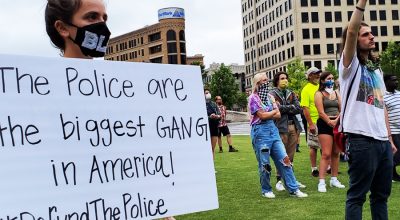
It is reported that Chattanooga Mayor Andy Berke is angling to impose a decree for people in the city limits that they must wear masks in public in light of the “ongoing pandemic” of CV-19.
By David Tulis / NoogaRadio 92.7 FM
The prospect is another element of a sweeping program of intimidation and unconstitutional acts by Republicans and Democrats in Tennessee elected office.
Do you have a defense to a criminal charge of not wearing a diaper on your chin? Yes.
Can you do anything to thwart and complicate the mayor’s proposed use of police enforcing a chin diaper edict? Yes.
Asserting your due process rights
An officer approaches you as you stand at a crosswalk downtown near your bank.
“Ma’am, you are not wearing a mask, and the mayor has ordered that everyone in public have a mask.”
“I’m sorry, I am not wearing a mask, and it’s none of your business to know why. I am not talking to you and I don’t answer questions. Am I being detained — the light is red — please excuse me — I’m crossing the street.”
He holds up a tattoo-bespeckled arm and hand to block you.
“No, ma’am. You are not free to leave. You are being detained. You have committed an offense of not wearing a mask. Do you know about the city’s order to wear one?” (He’s trying to establish mens rea, or guilty mind)
“Yes, but I don’t agree with it. It’s not healthy, and I’m not doing it. I have a right to not wear a mask if I don’t want to.”
The cop and the mayor probably believe the officer has power to threaten you and to arrest you on the spot for a “violation” if his discretion suggests he do so.
However, in this encounter, the officer does not have legal authority to arrest you. He’s prohibited by law from doing so.
Two powerful laws grant — and limit — his authority.
➤ No. 1, the constitution. Arrests in Tennessee are, to start off, flatly prohibited. But the constitution allows them if an individual commits a crime. A crime is discernable under two qualifications — under warrant, or under probable cause. Without a crime, no cop has any authority over the private citizen.
Article 1, Section 7. That the people shall be secure in their persons, houses, papers and possessions, from unreasonable searches and seizures [arrest warrant required]; and that general warrants, whereby an officer may be commanded to search suspected places, without evidence of the fact committed, or to seize any person or persons not named, whose offences are not particularly described and supported by evidence [probable cause], are dangerous to liberty and ought not be granted.
The cop confronting you at the downtown intersection has power over you under probable cause or under warrant.
➤ No. 2 limiter of cop authority — a wonderful law that gums up the works for deputies and cops and prevents on-the-spot arrest in many, many cases.
It’s a law whose main premise is hostile to the citizen in that it reduces his constitutional rights. Even so, because it is written and explicit, it gives the protection of specificity in carving out exceptions to the general ban in the constitution on arrests.
The legislature, at Tenn. Code Ann. § 40-7-103, arrest by officer without warrant, grants specific limited instances where you can be arrested apart from a warrant. This law is a grant of power to the state, giving effectively an inch to the officer. In practice, as I have reported in detail, state actors take a mile in the exercise of their liberty, their freedom, their “right” to be free from external constraint of their policing and law enforcement activity. What they gain, you lose.
Still, despite abuses allowed by Sheriff Jim Hammond, Mayor Andy Berke, chief David Roddy, county magistrates such as Lorrie Miller and also by sessions court judges — despite their custom and despite violations by the tens of thousands, the law is clear. You cannot be arrested apart from the enumerated list of offenses in this law.
Is a bare face a ‘public offense’?
The only possible way that the officer could arrest you without a warrant is if your being in public without a mask is a “public offense committed in the office’s presence.”
Click this link to see a PDF of the law with highlights. Go ahead, it’s not long or complicated.
What is a public offense? A public offense, in short, is the type of offense that causes public alarm, consternation, fear, dread, disturbance, an act which has in it an implied threat to personal safety and well-being of other people in public. If the act in question (no mask) is a “public offense” and if your doing this deed is “in the officer’s presence,” he can arrest you on the spot — right there as traffic passes the stoplight flicking from red to green.
I gave a detailed notice April 15 to the City of Chattanooga corporation that explains what public offense means. The document was given to the city is at the link below. It explains the court cases that establish the meaning of public offense and makes clear that numerous offenses that routinely spark instant arrest are not subject to instant arrest and require an arrest warrant.
The question now is this: Does a bare face create public fear, dread, scandal? Is a bare face in the nature of a “breach of the peace,” a riot, affray or disorder?
The answer is — no.
Not wearing a mask causes no social disturbance or sense of alarm or danger. A bare face is not a public offense, and the mayor cannot by decree turn it into one.
Just ask a magistrate.
That is the point of the law to begin with.
Ask the magistrate. Get judicial approval for the arrest. That is your accuser’s assignment — get judicial warrant to arrest you. That’s the law. Implied in that duty is freedom and liberty under constitutional government. With the warrant requirement honored, we are as free as we can be.
Law makes arrest complicated, time consuming
Here’s what has to happen between you and the Chattanooga police officer who has waylaid you at the crosswalk about your open face.
Masklessness under the Berke government is an offense, perhaps, but not one meeting the test at 40-7-103.
The officer understands his duty to affect an arrest is to obtain as much information from you as you are willing to give him, so that he can fill out the warrant under oath with all necessary information to give you service of the warrant. If it were me, I would say I don’t answer any questions. If he gets no details orally, he has his bodycam video, and a screengrab from the video would be incorporated by reference into the arrest warrant, since he doesn’t have your name or address.
Under the law, because we are the free people of Tennessee under free government, he has to let you go. “Ma’am, you are free to leave. I will arrest you later.”
Next, he must go to the county jail, click his class ring on the glass window for Lorrie Miller, Rodney Strong or the magistrate on duty. He has to swear he approached you, declare that you committed a crime subject to arrest and convince the magistrate to sign the arrest warrant under 40-7-103. He puts the written warrant in hand, departs the jail, gets into his cruiser, goes and find you at your address (assuming you are in the city) and takes you into custody. If you are in the county, he has to approach the sheriff’s department to ask if one of its deputies would serve and arrest you.
That is the process that has to happen for the arrest to be lawful in respect of your due process rights under the 14th amendment and under the Tennessee bill of rights.
It’s complicated.
It’s time consuming.
It limits the harvest the cops are used to threshing upon the courthouse benches and floors.
Extra dollars for you in tort judgment
The short of it is that you cannot be arrested for not wearing a mask in public without a warrant first being obtained. Your arrest has to be a judicial finding, not an executive branch agent decision made on the officer’s personal authority. It’s under law, not under any individual’s say so.
You are arrested lawfully, not under the cop’s discretion, or the mayor’s.
Is not wearing a mask a criminal act?
The answer is no. We live in a system of positive law. Evil deeds are codified as crimes by the general assembly. The mayor lacks authority to create a crime by decree. He cannot use limited municipal authority to create on the spot the crime of “not wearing a mask.”
City council and the corporation have been under my administrative notice since April 15 is important in your filing suit against the city if Mayor Berke arrests you. If you are arrested without warrant, you have an extra tort injury. That the officer arrested you despite proper and unrebutted administrative notice adds to your claim the element of aggravated, intentional and malicious arrest.
An arrest done in bad faith, in violation of clear law, in violation of administrative notice, might be worth an additional F$100,000 in your civil action for false arrest under pretended law. Maybe a little less. Maybe a little more.
As I told city council members in delivering notice to its members April 15:
If you and your officers exceed the grants given in statute, you are putting yourselves — your persons and estates — in jeopardy. You violate the oath of office and open yourself or your officers to tort action by private attorneys for damage in violation of an individual’s right to due process.
A response to this notice is not legally required. However, under well established rules regarding notice in Tennessee case law, nonresponse will be understood at trial as an act of acquiescence and acceptance, an estoppel to any denial that you knew the black-letter law as written and explained.


